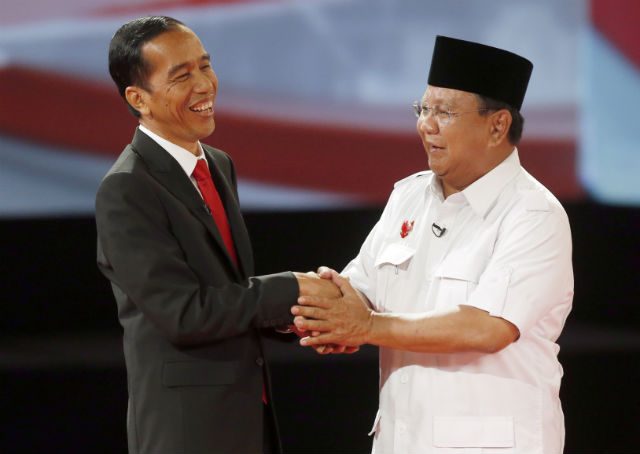SUMMARY
This is AI generated summarization, which may have errors. For context, always refer to the full article.
 Foreign policy wonks were thrilled when the Philippines and Indonesia signed a landmark agreement in May this year, effectively ending two decades of disputes on maritime territory covered by the two countries’ overlapping exclusive economic zones situated between the Mindanao and Celebes seas. (READ: Philippines, Indonesia seal historic maritime deal)
Foreign policy wonks were thrilled when the Philippines and Indonesia signed a landmark agreement in May this year, effectively ending two decades of disputes on maritime territory covered by the two countries’ overlapping exclusive economic zones situated between the Mindanao and Celebes seas. (READ: Philippines, Indonesia seal historic maritime deal)The accord – hailed by many as a maritime dispute resolution exemplar – may well be the legacy of Indonesia President Susilo Bambang Yudhoyono’s administration to its neighboring archipelago as well as to the wider Southeast Asian region now faced with rising tensions.
Yudhoyono – leader of the country logically perceived as the fulcrum of the Association of Southeast Asian Nations (ASEAN) for its geographic and population size – is retiring in October.
Under his presidency, Indonesia grew not only its economy but also its foreign influence aspirations, never mind if, according to the Lowy Institute, the country’s resources and actual impact only achieved decent outcomes.
With Philippine diplomats, including Department of Foreign Affairs Secretary Albert del Rosario, increasingly turning to ASEAN for support against China’s expansionist moves in the South China Sea, Indonesia’s centrality to ASEAN make the July elections significant to Philippines foreign policy.

Widely popular former Jakarta Governor Joko (fondly called “Jokowi”) Widodo initially dominated the campaign season. But old guard Suharto-era former general Prabowo Subianto whose military record is checkered by human rights violations has caught up in pre-election polls as the campaign approached the homestretch. (READ: Indonesian election too close to call)
Analysts are convinced that neither of the contending candidates is likely to steer status quo foreign policy towards a radically different direction. In fact, both have themselves gestured towards continuity.
At issue for the Philippines will be the post-Yudhoyono’s administration’s own appreciation of Indonesia’s role in ASEAN and its relations with the United States and China. But differing alliances, sources of support, ideological commitments, and political experience between Jokowi and Prabowo offer subtly varied spices too. (Read: Indonesian presidential candidates differ on South China Sea)
How these forces will play out and how the emerging victor will exploit them to consolidate authority after elections can have distinct implications.
With the US pivot to Asia appearing less and less persuasive in deterring regional geopolitical tensions, the Philippines’ stake in a weightier ASEAN is becoming clearer.
Observers like Awidya Santikajaya are convinced that the next president of Indonesia will continue calling for a more cohesive regional bloc while maintaining what Ted Piccone and Bimo Yusman have called a policy of making “a million friends and zero enemies.”
But with regards to ASEAN, there are two questions relevant to Philippine foreign policy and national interest:
- Between Jokowi and Prabowo, who has a more compelling political capital that would convince member countries to make ASEAN more pro-active in addressing collective security concerns?
- And a second related question, who between them is burdened with less political baggage to make a more decisive claim?
A crucial differentiating factor can be gleaned from the orientation and affiliation of figures who have thrown their support behind each candidate. With neither of the candidate’s respective coalitions garnering a clear majority in the April 9 legislative elections, the scramble for political support in the run up to the presidential elections has led both to concoct equally promiscuous mixes.
Frontrunner Jokowi of former president Megawati Sukarnoputri’s Indonesian Democratic Party of Struggle (PDI-P) may be widely perceived as a clean and bottom-up oriented politician. But Indonesia politics experts say he is inexperienced and may rely heavily on advisors led on the foreign policy front by a leader of the second largest Muslim organization in the country.
Further, Jokowi counts former armed forces commander retired general Wiranto and his People’s Conscience Party among his coalition supporters. Wiranto has been implicated in the past for Indonesia’s military atrocities in Timor Leste. But even with Wiranto supporting him, Jokowi is unlikely to steer Indonesia away from its increased public promotion of democracy, especially the compatibility of Muslim, human rights, and democratic governance. It may, however, haunt a Jokowi-led Indonesia lobby in ASEAN where human rights protection remains a touchy issue.
Human rights violation is, however, more strident in the case of Prabowo who was dismissed from military service after having been proven as licit to the kidnapping of anti-Suharto dictatorship activists in 1998. Prabowo’s alliance with four Islamic political parties also puts pressure on him to craft a more “Islamic” rather than merely “Muslim” foreign policy orientation.
Domestic trust and legitimacy in the eyes of the public would give the next president of Indonesia stronger presence and command in ASEAN. Distraction on the domestic front for the next president can quickly evaporate the associated benefits the Philippines has reaped from Indonesia’s rise to prominence under Yudhoyono’s watch.
A second set of speculative questions may still be raised:
- First, who between Jokowi and Prabowo will move Indonesia closer to China? What incentives or disincentives exist for each to steer a more Sino-leaning foreign policy?
- Second, who between Jokowi and Prabowo will further warm Indonesia’s relations with the United States? What incentives or disincentives exist for each to set Indonesia foreign policy sail westward?
Regardless of who wins on July 9, the alternative route towards securing stability in the South China Sea – that is, between waiting for a US pivot to concretely materialize on the one hand, and the international tribunal proceedings on the other hand, that China has repeatedly insisted it will snub – should be clear for Philippine foreign policy: a more compelling ASEAN bloc which hopefully President Yudhoyono’s successor could help build.
RR Raneses is an Instructor at the Department of Political Science, Ateneo de Manila University. On academic leave this semester, he is presently a senior research analyst for an Asia-wide business intelligence and risk reduction company.
Add a comment
How does this make you feel?
There are no comments yet. Add your comment to start the conversation.